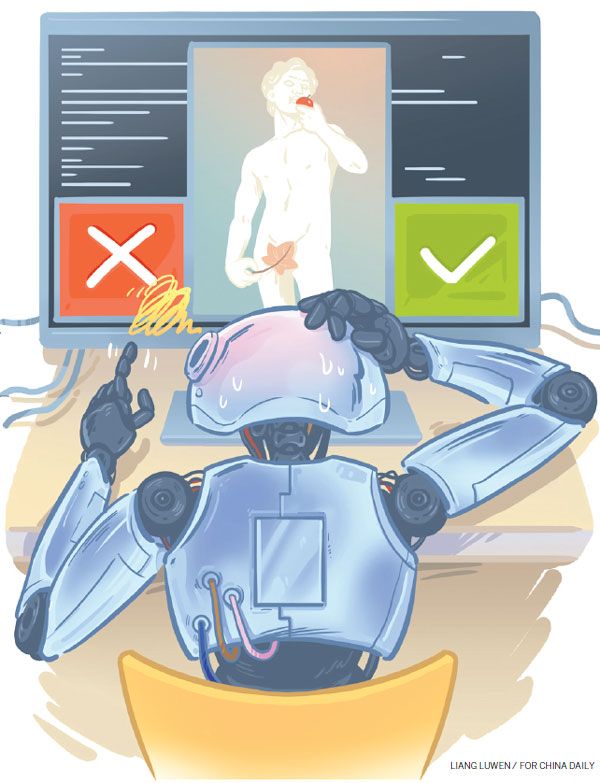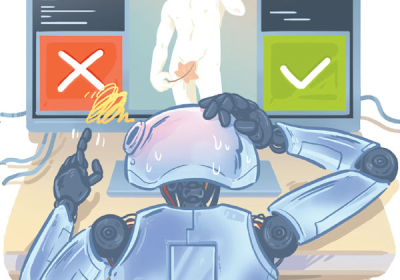
The 2018 World Internet of Things Expo is taking place in Wuxi city from Sept 15 to 18, an essential occasion to highlight global efforts to promote the development of industrial AI, big data and IoT, in particular. Europe and China should join hands to bolster the technologies that are set to revolutionize manufacturing.
Wuxi, China's first and only national innovative demonstration zone for the IoT industry, would be an ideal place to exchange views on the promising opportunities for China-EU cooperation on industrial AI, which is key to IoT and smart manufacturing.
Industrial AI is playing a main role in IoT because of its ability to quickly wring insights from big data. IoT generates immense quantities of data from sensors and connected things, but that data would just be background noise without applying AI and machine learning.
To most people, consumer-market AI applications are much visible, for instance, we have seen robots serving in restaurants or automatic cars “driving” on highways. However, consumer-applied AI only represents the tip of an iceberg. In the manufacturing industry, AI has initiated a revolution, increasing efficiency, boosting productivity, and enhancing quality of goods and delivery processes.
Centering on helping an enterprise monitor, optimize or control the behavior of these operations and systems to improve their efficiency and performance, industrial AI will greatly benefit industries with performance enhancement, cost control, optimization of processes, shortened product cycle development times, and improved efficiency.
The value-add of AI also includes 24/7 availability and the capability of machines to learn through experience. It is set to unleash industries’ great potential and bring jobs, growth.
A 2017 study by PWC calculated global GDP will be 14 percent higher by 2030 as a result of AI adoption, contributing an additional $15.7 trillion to the global economy.
There is already some successful application of industrial AI. For instance, Ali Cloud’s ET Brain 2.0 was just launched in Wuxi’s Xuelang town, to tap into the synergies for the country’s wealthy Yangtze River Delta Region.
In the EU, AI is also booming while startups are playing a key role. In Germany for example, the startup KONUX - founded only in 2014 - raised $38.5 million to create an end-to-end IoT sensor platform for industrial clients.
At the global level, countries are racing to lead in AI, making AI an industrial priority and part of their national strategies.
In April 2018, the EU Commission adopted the Communication on Artificial Intelligence, organizing three concerns: the need to boost the EU’s AI capacity, ethical issues and social challenges. However, Brussels has been heavily criticized of insufficiently addressing how to boost the continent’s AI capacity.
In July 2018, Germany’s federal cabinet released a paper which outlined its AI goals. Berlin seeks to strengthen and expand German and European research in AI and focus on the transfer of research results to the private sector and the creation of AI applications. Principally, the plan focuses on integrating AI technologies into its export sectors.
China’s move was much earlier. In July 2017, Beijing released its Next Generation AI Development Plan in order to become the world leader in the field by 2030.
The point is Beijing and Brussels should join hands to develop industrial AI as they are essential to each other.
China has been the largest consumer of industrial robots for six consecutive years. According to IFR (International Federation of Robotics) data, the size of China's industrial robot market was $4.2 billion in 2017, accounting for 27 percent of the global total, and will expand to $5.9 billion by 2020.
China has unique advantages to develop industrial AI.
First of all, data, the fuel of AI. Machine learning technology shoring up the current AI boom is extremely dependent on data. Due to China's population and large amount of equipment, Chinese enterprises have a natural advantage in accessing data.
Second, the hardware equipment and factories of Chinese manufacturing sector are relatively new compared with European companies, making it easier to realize equipment connection and plant transformation.
Third, Chinese manufacturing companies are willing to apply industrial AI. Deloitte's intelligent manufacturing research found that 51 percent of Chinese respondents use AI in manufacturing and management processes, and 46 percent of respondents have or plan to deploy AI in products and services.
Industrial AI is key for China to address its ageing problem and its corollary, the increasing labor cost, the country is set to be a giant market and main user of industrial AI, and EU undertakings are well aware of it.
The EU has its own strength: half of the top 10 nations with the most industrial robots per 10,000 employees belong to the EU. The highly developed nature of automation in Europe is also clear from looking at the manufacturing industry. Of the 22 countries with an above-average robot density, 14 are located in the EU. The robot density in the big Western European economies is still currently ahead of up-and-coming China.
The strength of the EU lies in its human capital, not only the number of highly skilled researchers and developers, but also an intellectual tradition dating back to the 16th century.
European startups can provide a substantial contribution given that China lacks talents and core technologies, as reflected by its share of patents of industrial robotics: less than 1 percent Most of Chinese robot manufacturers fail to own prototypes and have to focus on system integration.
AI and, in particular, industrial AI, are definitively areas where win-win agreements can be reached between the EU and China. The combination of China’s giant market and Europe’s traditional strength is set to unleash both great potential and benefit their industries.
Luigi Gambardella is president of ChinaEU. The author contributed this article to China Watch exclusively. The views expressed do not necessarily reflect those of China Watch.






